Leadership and Culture: Analyzing Hydro Generation's Case Study
VerifiedAdded on 2023/01/12
|7
|1332
|43
Case Study
AI Summary
This case study examines the organizational structure and leadership challenges faced by Hydro Generation (HG), a US-based company, focusing on the situation of Brett Jones at a dam project in Tanzania. The problem revolves around Jones's effectiveness in the project, considering his qualifications, experience, and cultural considerations. The study applies Handy's culture model (power, role, task, and person culture) and Hofstede's cultural dimensions (power distance, individualism vs. collectivism, masculinity vs. femininity, uncertainty avoidance, and long vs. short-term orientation) to analyze the situation. The case highlights the importance of managing cultural differences, fostering relationships between employees, and aligning individual behaviors with the company's culture. The recommendation suggests that Jones is a suitable fit for the project, but that the company should provide training to both Jones and the expatriates to improve their interactions and overall project success. The analysis emphasizes the need for effective leadership and cross-cultural communication in multinational organizations.
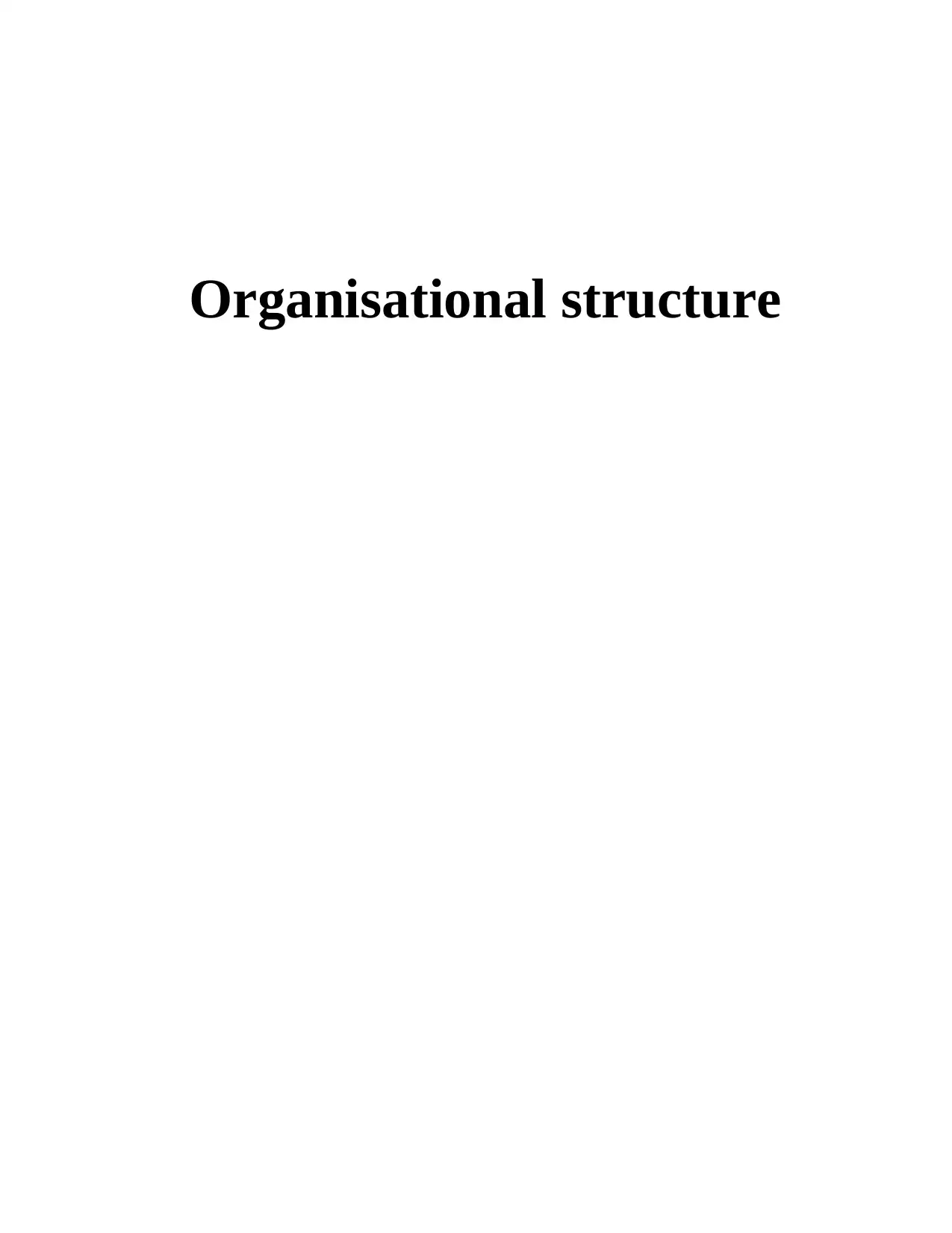
Organisational structure
Paraphrase This Document
Need a fresh take? Get an instant paraphrase of this document with our AI Paraphraser
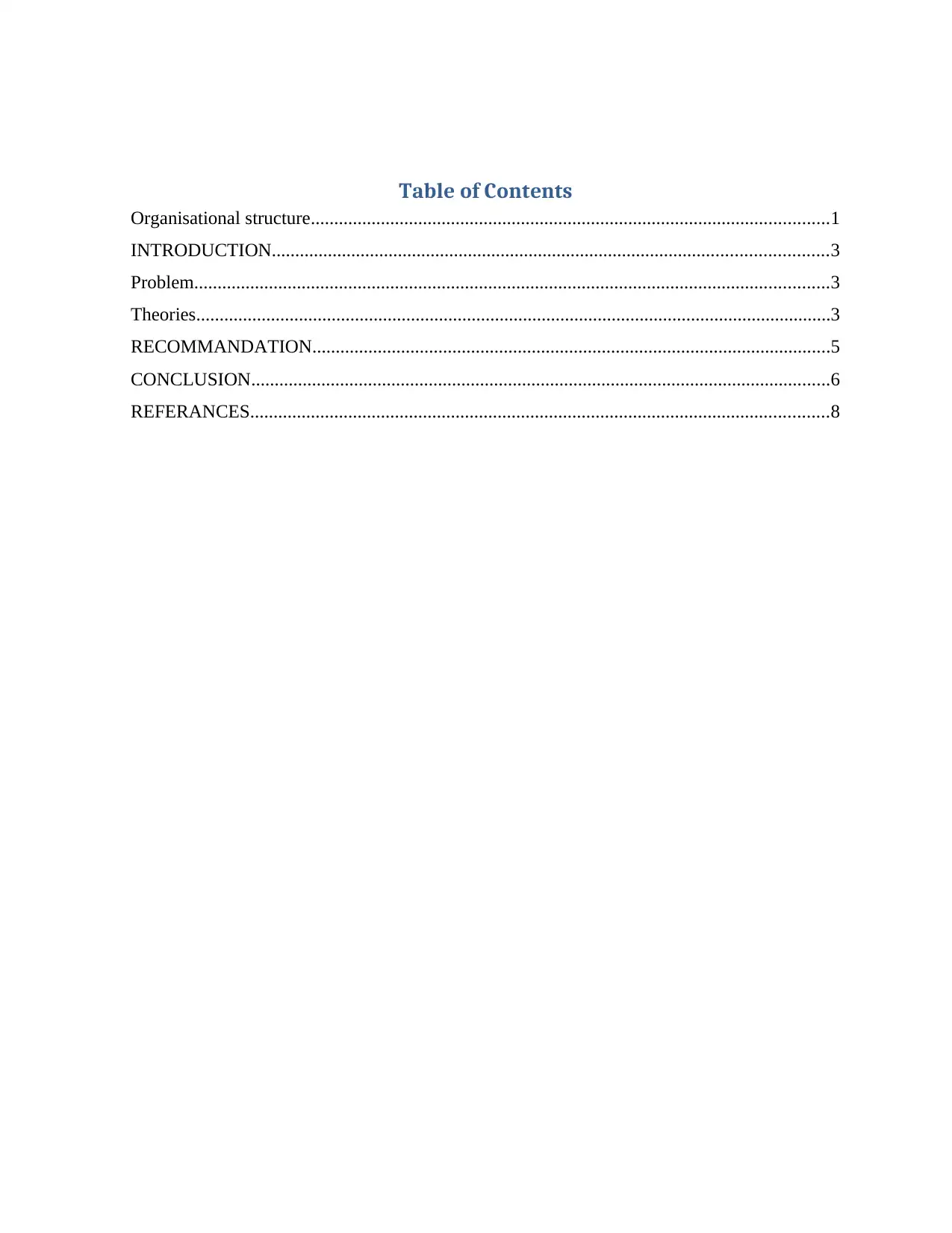
Table of Contents
Organisational structure...............................................................................................................1
INTRODUCTION.......................................................................................................................3
Problem........................................................................................................................................3
Theories........................................................................................................................................3
RECOMMANDATION...............................................................................................................5
CONCLUSION............................................................................................................................6
REFERANCES............................................................................................................................8
Organisational structure...............................................................................................................1
INTRODUCTION.......................................................................................................................3
Problem........................................................................................................................................3
Theories........................................................................................................................................3
RECOMMANDATION...............................................................................................................5
CONCLUSION............................................................................................................................6
REFERANCES............................................................................................................................8
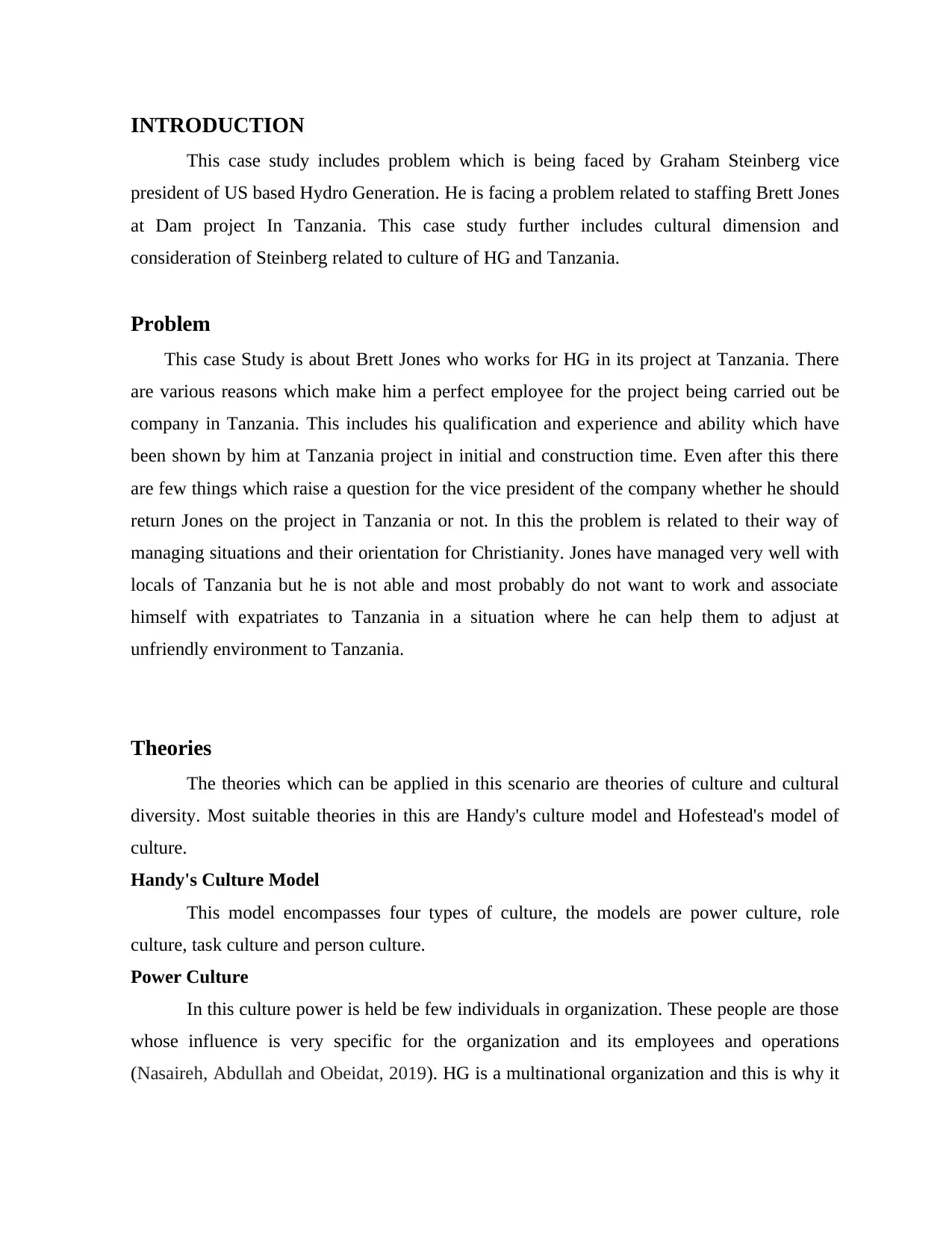
INTRODUCTION
This case study includes problem which is being faced by Graham Steinberg vice
president of US based Hydro Generation. He is facing a problem related to staffing Brett Jones
at Dam project In Tanzania. This case study further includes cultural dimension and
consideration of Steinberg related to culture of HG and Tanzania.
Problem
This case Study is about Brett Jones who works for HG in its project at Tanzania. There
are various reasons which make him a perfect employee for the project being carried out be
company in Tanzania. This includes his qualification and experience and ability which have
been shown by him at Tanzania project in initial and construction time. Even after this there
are few things which raise a question for the vice president of the company whether he should
return Jones on the project in Tanzania or not. In this the problem is related to their way of
managing situations and their orientation for Christianity. Jones have managed very well with
locals of Tanzania but he is not able and most probably do not want to work and associate
himself with expatriates to Tanzania in a situation where he can help them to adjust at
unfriendly environment to Tanzania.
Theories
The theories which can be applied in this scenario are theories of culture and cultural
diversity. Most suitable theories in this are Handy's culture model and Hofestead's model of
culture.
Handy's Culture Model
This model encompasses four types of culture, the models are power culture, role
culture, task culture and person culture.
Power Culture
In this culture power is held be few individuals in organization. These people are those
whose influence is very specific for the organization and its employees and operations
(Nasaireh, Abdullah and Obeidat, 2019). HG is a multinational organization and this is why it
This case study includes problem which is being faced by Graham Steinberg vice
president of US based Hydro Generation. He is facing a problem related to staffing Brett Jones
at Dam project In Tanzania. This case study further includes cultural dimension and
consideration of Steinberg related to culture of HG and Tanzania.
Problem
This case Study is about Brett Jones who works for HG in its project at Tanzania. There
are various reasons which make him a perfect employee for the project being carried out be
company in Tanzania. This includes his qualification and experience and ability which have
been shown by him at Tanzania project in initial and construction time. Even after this there
are few things which raise a question for the vice president of the company whether he should
return Jones on the project in Tanzania or not. In this the problem is related to their way of
managing situations and their orientation for Christianity. Jones have managed very well with
locals of Tanzania but he is not able and most probably do not want to work and associate
himself with expatriates to Tanzania in a situation where he can help them to adjust at
unfriendly environment to Tanzania.
Theories
The theories which can be applied in this scenario are theories of culture and cultural
diversity. Most suitable theories in this are Handy's culture model and Hofestead's model of
culture.
Handy's Culture Model
This model encompasses four types of culture, the models are power culture, role
culture, task culture and person culture.
Power Culture
In this culture power is held be few individuals in organization. These people are those
whose influence is very specific for the organization and its employees and operations
(Nasaireh, Abdullah and Obeidat, 2019). HG is a multinational organization and this is why it
⊘ This is a preview!⊘
Do you want full access?
Subscribe today to unlock all pages.

Trusted by 1+ million students worldwide
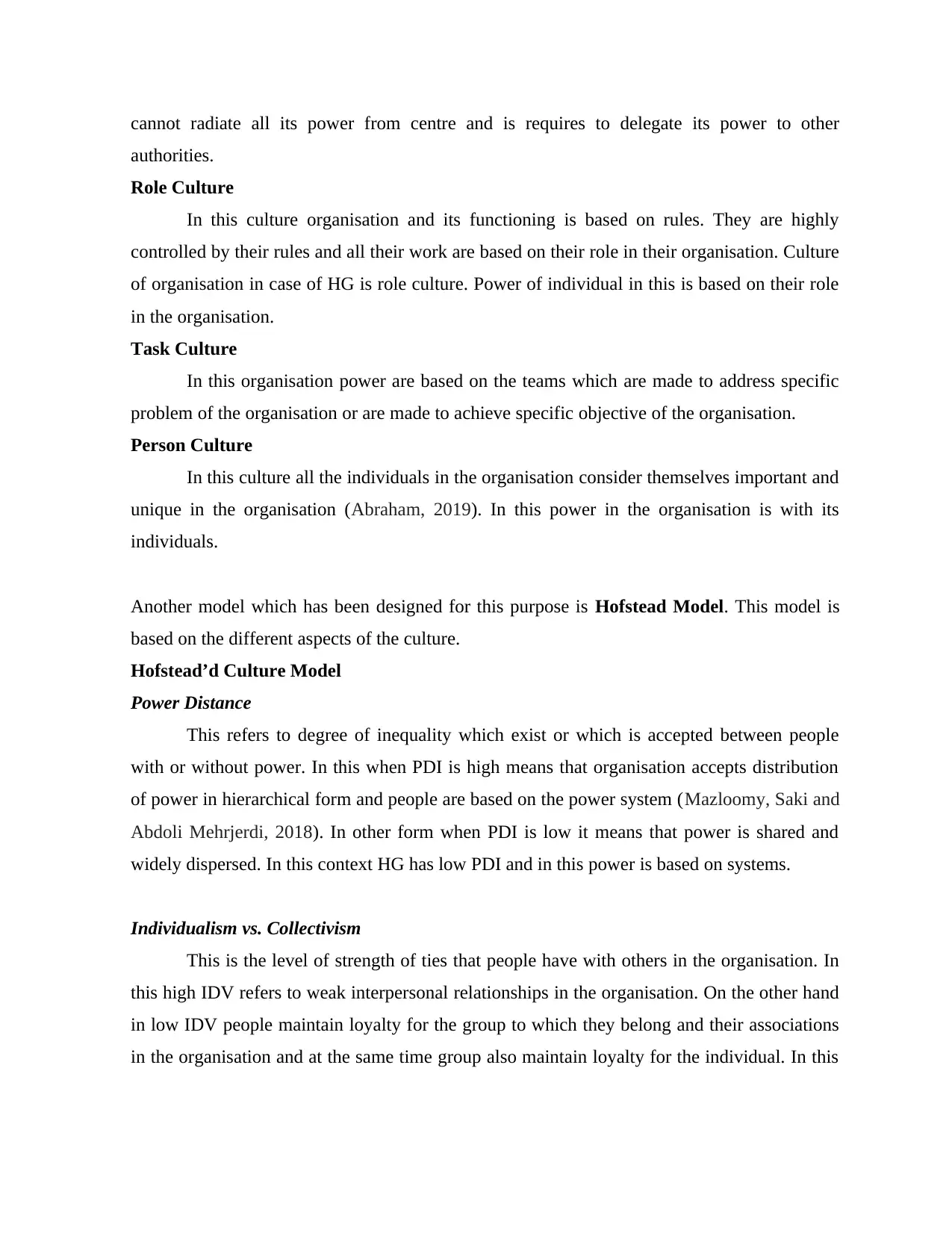
cannot radiate all its power from centre and is requires to delegate its power to other
authorities.
Role Culture
In this culture organisation and its functioning is based on rules. They are highly
controlled by their rules and all their work are based on their role in their organisation. Culture
of organisation in case of HG is role culture. Power of individual in this is based on their role
in the organisation.
Task Culture
In this organisation power are based on the teams which are made to address specific
problem of the organisation or are made to achieve specific objective of the organisation.
Person Culture
In this culture all the individuals in the organisation consider themselves important and
unique in the organisation (Abraham, 2019). In this power in the organisation is with its
individuals.
Another model which has been designed for this purpose is Hofstead Model. This model is
based on the different aspects of the culture.
Hofstead’d Culture Model
Power Distance
This refers to degree of inequality which exist or which is accepted between people
with or without power. In this when PDI is high means that organisation accepts distribution
of power in hierarchical form and people are based on the power system (Mazloomy, Saki and
Abdoli Mehrjerdi, 2018). In other form when PDI is low it means that power is shared and
widely dispersed. In this context HG has low PDI and in this power is based on systems.
Individualism vs. Collectivism
This is the level of strength of ties that people have with others in the organisation. In
this high IDV refers to weak interpersonal relationships in the organisation. On the other hand
in low IDV people maintain loyalty for the group to which they belong and their associations
in the organisation and at the same time group also maintain loyalty for the individual. In this
authorities.
Role Culture
In this culture organisation and its functioning is based on rules. They are highly
controlled by their rules and all their work are based on their role in their organisation. Culture
of organisation in case of HG is role culture. Power of individual in this is based on their role
in the organisation.
Task Culture
In this organisation power are based on the teams which are made to address specific
problem of the organisation or are made to achieve specific objective of the organisation.
Person Culture
In this culture all the individuals in the organisation consider themselves important and
unique in the organisation (Abraham, 2019). In this power in the organisation is with its
individuals.
Another model which has been designed for this purpose is Hofstead Model. This model is
based on the different aspects of the culture.
Hofstead’d Culture Model
Power Distance
This refers to degree of inequality which exist or which is accepted between people
with or without power. In this when PDI is high means that organisation accepts distribution
of power in hierarchical form and people are based on the power system (Mazloomy, Saki and
Abdoli Mehrjerdi, 2018). In other form when PDI is low it means that power is shared and
widely dispersed. In this context HG has low PDI and in this power is based on systems.
Individualism vs. Collectivism
This is the level of strength of ties that people have with others in the organisation. In
this high IDV refers to weak interpersonal relationships in the organisation. On the other hand
in low IDV people maintain loyalty for the group to which they belong and their associations
in the organisation and at the same time group also maintain loyalty for the individual. In this
Paraphrase This Document
Need a fresh take? Get an instant paraphrase of this document with our AI Paraphraser
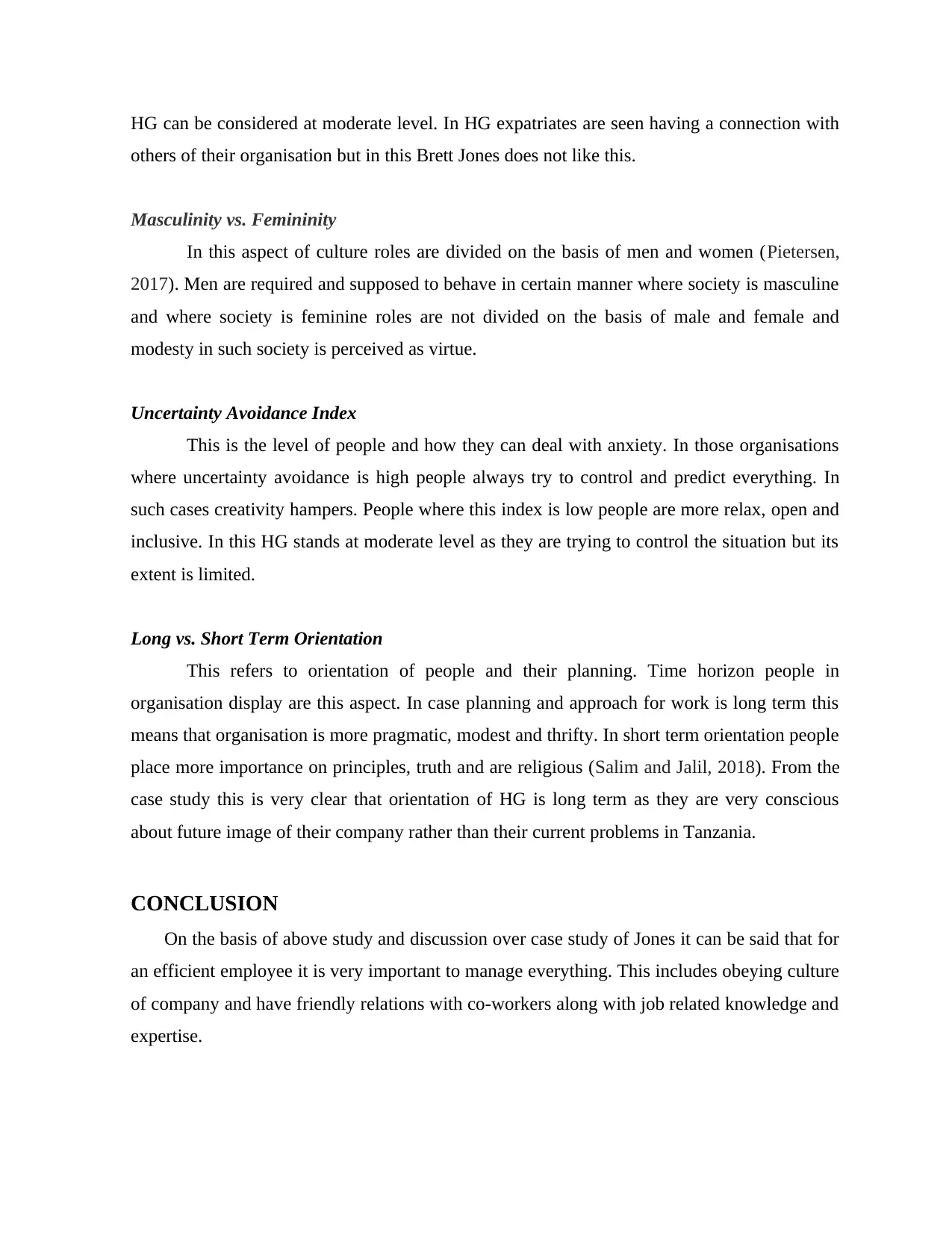
HG can be considered at moderate level. In HG expatriates are seen having a connection with
others of their organisation but in this Brett Jones does not like this.
Masculinity vs. Femininity
In this aspect of culture roles are divided on the basis of men and women (Pietersen,
2017). Men are required and supposed to behave in certain manner where society is masculine
and where society is feminine roles are not divided on the basis of male and female and
modesty in such society is perceived as virtue.
Uncertainty Avoidance Index
This is the level of people and how they can deal with anxiety. In those organisations
where uncertainty avoidance is high people always try to control and predict everything. In
such cases creativity hampers. People where this index is low people are more relax, open and
inclusive. In this HG stands at moderate level as they are trying to control the situation but its
extent is limited.
Long vs. Short Term Orientation
This refers to orientation of people and their planning. Time horizon people in
organisation display are this aspect. In case planning and approach for work is long term this
means that organisation is more pragmatic, modest and thrifty. In short term orientation people
place more importance on principles, truth and are religious (Salim and Jalil, 2018). From the
case study this is very clear that orientation of HG is long term as they are very conscious
about future image of their company rather than their current problems in Tanzania.
CONCLUSION
On the basis of above study and discussion over case study of Jones it can be said that for
an efficient employee it is very important to manage everything. This includes obeying culture
of company and have friendly relations with co-workers along with job related knowledge and
expertise.
others of their organisation but in this Brett Jones does not like this.
Masculinity vs. Femininity
In this aspect of culture roles are divided on the basis of men and women (Pietersen,
2017). Men are required and supposed to behave in certain manner where society is masculine
and where society is feminine roles are not divided on the basis of male and female and
modesty in such society is perceived as virtue.
Uncertainty Avoidance Index
This is the level of people and how they can deal with anxiety. In those organisations
where uncertainty avoidance is high people always try to control and predict everything. In
such cases creativity hampers. People where this index is low people are more relax, open and
inclusive. In this HG stands at moderate level as they are trying to control the situation but its
extent is limited.
Long vs. Short Term Orientation
This refers to orientation of people and their planning. Time horizon people in
organisation display are this aspect. In case planning and approach for work is long term this
means that organisation is more pragmatic, modest and thrifty. In short term orientation people
place more importance on principles, truth and are religious (Salim and Jalil, 2018). From the
case study this is very clear that orientation of HG is long term as they are very conscious
about future image of their company rather than their current problems in Tanzania.
CONCLUSION
On the basis of above study and discussion over case study of Jones it can be said that for
an efficient employee it is very important to manage everything. This includes obeying culture
of company and have friendly relations with co-workers along with job related knowledge and
expertise.
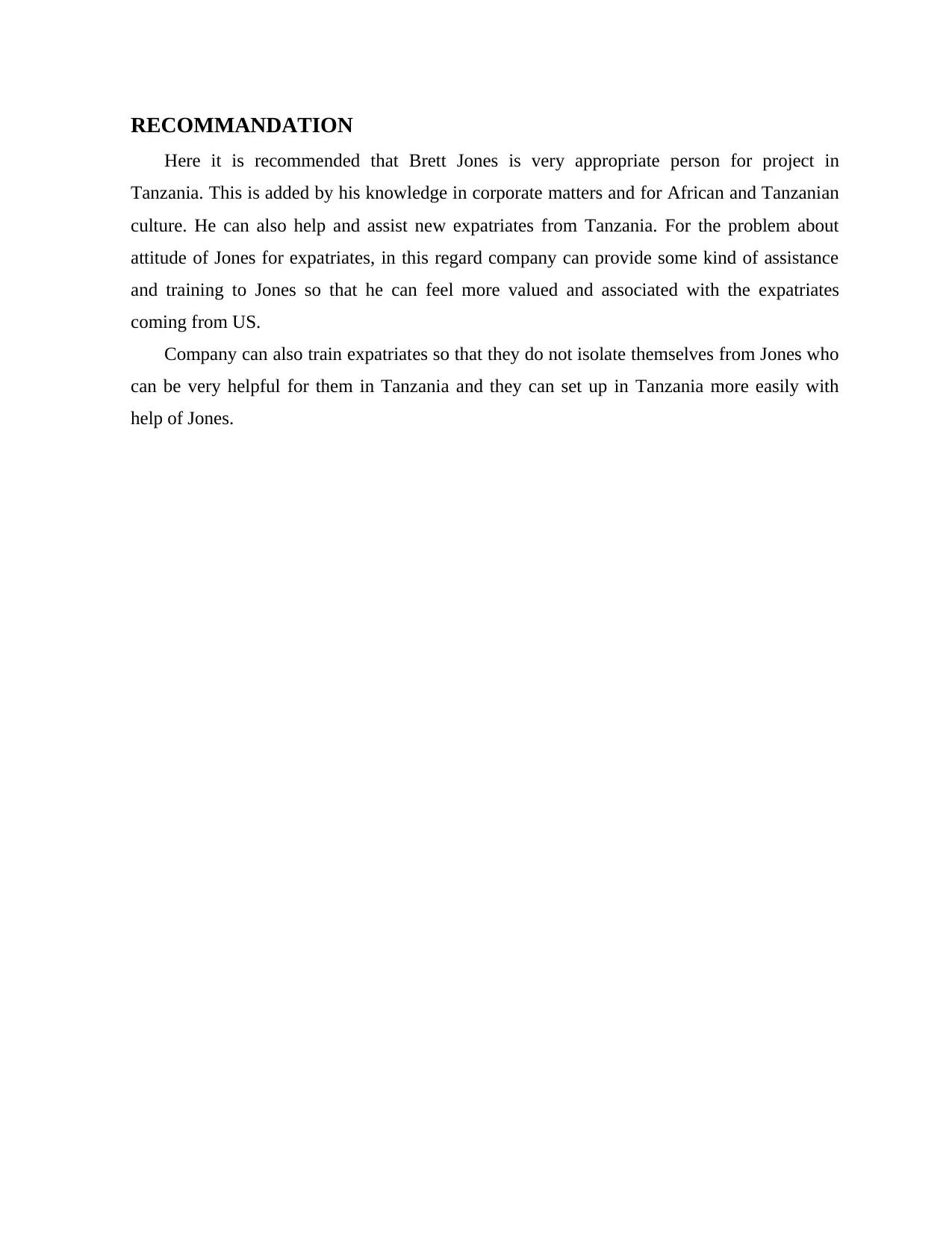
RECOMMANDATION
Here it is recommended that Brett Jones is very appropriate person for project in
Tanzania. This is added by his knowledge in corporate matters and for African and Tanzanian
culture. He can also help and assist new expatriates from Tanzania. For the problem about
attitude of Jones for expatriates, in this regard company can provide some kind of assistance
and training to Jones so that he can feel more valued and associated with the expatriates
coming from US.
Company can also train expatriates so that they do not isolate themselves from Jones who
can be very helpful for them in Tanzania and they can set up in Tanzania more easily with
help of Jones.
Here it is recommended that Brett Jones is very appropriate person for project in
Tanzania. This is added by his knowledge in corporate matters and for African and Tanzanian
culture. He can also help and assist new expatriates from Tanzania. For the problem about
attitude of Jones for expatriates, in this regard company can provide some kind of assistance
and training to Jones so that he can feel more valued and associated with the expatriates
coming from US.
Company can also train expatriates so that they do not isolate themselves from Jones who
can be very helpful for them in Tanzania and they can set up in Tanzania more easily with
help of Jones.
⊘ This is a preview!⊘
Do you want full access?
Subscribe today to unlock all pages.

Trusted by 1+ million students worldwide
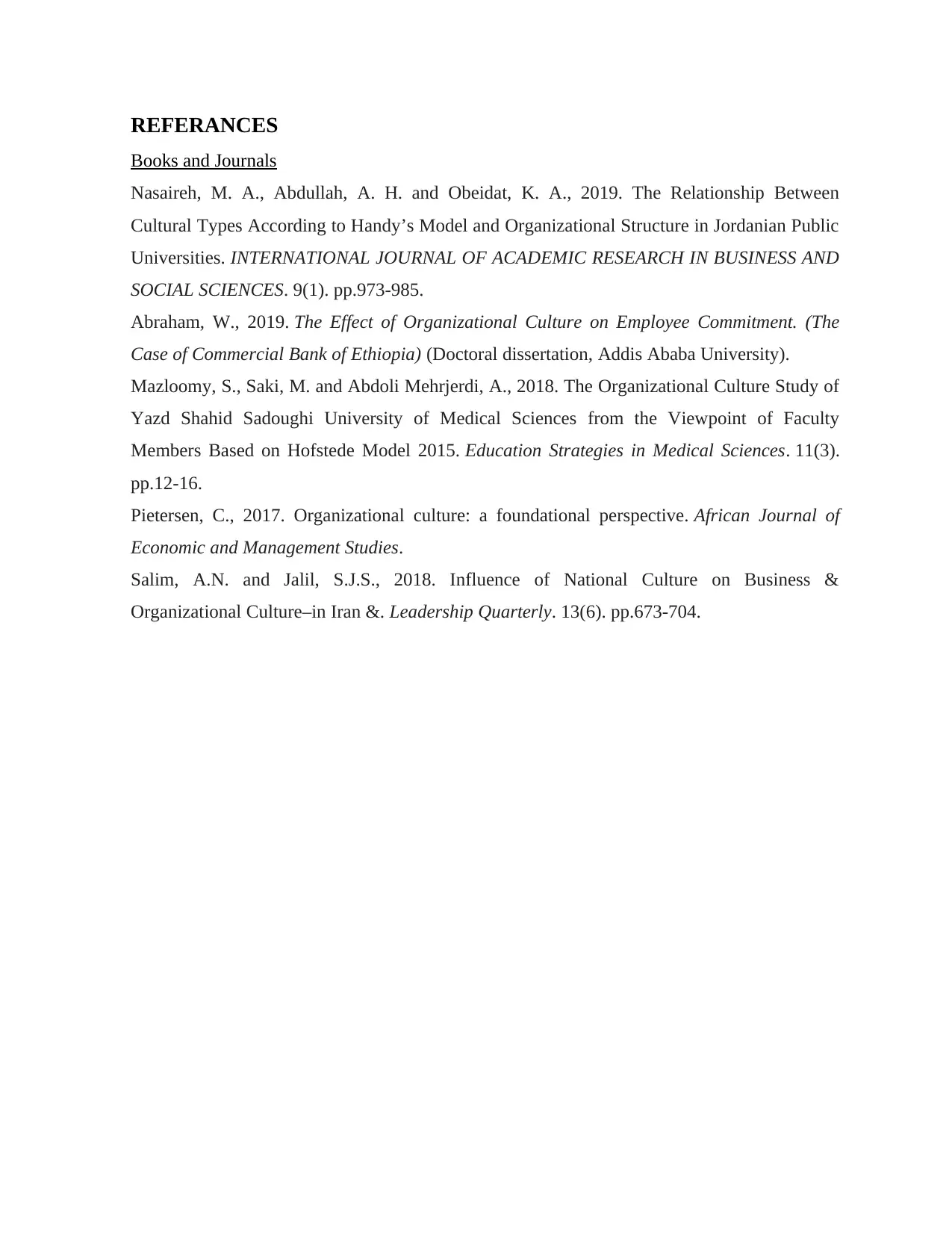
REFERANCES
Books and Journals
Nasaireh, M. A., Abdullah, A. H. and Obeidat, K. A., 2019. The Relationship Between
Cultural Types According to Handy’s Model and Organizational Structure in Jordanian Public
Universities. INTERNATIONAL JOURNAL OF ACADEMIC RESEARCH IN BUSINESS AND
SOCIAL SCIENCES. 9(1). pp.973-985.
Abraham, W., 2019. The Effect of Organizational Culture on Employee Commitment. (The
Case of Commercial Bank of Ethiopia) (Doctoral dissertation, Addis Ababa University).
Mazloomy, S., Saki, M. and Abdoli Mehrjerdi, A., 2018. The Organizational Culture Study of
Yazd Shahid Sadoughi University of Medical Sciences from the Viewpoint of Faculty
Members Based on Hofstede Model 2015. Education Strategies in Medical Sciences. 11(3).
pp.12-16.
Pietersen, C., 2017. Organizational culture: a foundational perspective. African Journal of
Economic and Management Studies.
Salim, A.N. and Jalil, S.J.S., 2018. Influence of National Culture on Business &
Organizational Culture–in Iran &. Leadership Quarterly. 13(6). pp.673-704.
Books and Journals
Nasaireh, M. A., Abdullah, A. H. and Obeidat, K. A., 2019. The Relationship Between
Cultural Types According to Handy’s Model and Organizational Structure in Jordanian Public
Universities. INTERNATIONAL JOURNAL OF ACADEMIC RESEARCH IN BUSINESS AND
SOCIAL SCIENCES. 9(1). pp.973-985.
Abraham, W., 2019. The Effect of Organizational Culture on Employee Commitment. (The
Case of Commercial Bank of Ethiopia) (Doctoral dissertation, Addis Ababa University).
Mazloomy, S., Saki, M. and Abdoli Mehrjerdi, A., 2018. The Organizational Culture Study of
Yazd Shahid Sadoughi University of Medical Sciences from the Viewpoint of Faculty
Members Based on Hofstede Model 2015. Education Strategies in Medical Sciences. 11(3).
pp.12-16.
Pietersen, C., 2017. Organizational culture: a foundational perspective. African Journal of
Economic and Management Studies.
Salim, A.N. and Jalil, S.J.S., 2018. Influence of National Culture on Business &
Organizational Culture–in Iran &. Leadership Quarterly. 13(6). pp.673-704.
1 out of 7
Related Documents
Your All-in-One AI-Powered Toolkit for Academic Success.
+13062052269
info@desklib.com
Available 24*7 on WhatsApp / Email
![[object Object]](/_next/static/media/star-bottom.7253800d.svg)
Unlock your academic potential
Copyright © 2020–2026 A2Z Services. All Rights Reserved. Developed and managed by ZUCOL.




